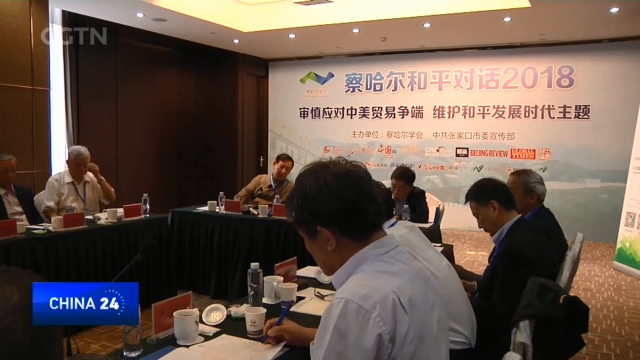
21:02, 11-Aug-2018
China-US Trade Frictions: Chinese scholars express concerns
Updated
20:35, 14-Aug-2018
03:06

Optimism and concerns are both mounting in the academic world over this trade conflict. Earlier today, over thirty Chinese scholars gathered to talk about what's been happening and proposed ways in moving forward. Wu Guoxiu reports.
University professors and former government officials. These experts were brought together by Charhar Institute, a non-governmental think tank on diplomacy and international affairs, to talk about the trade relations between China and the US. Professor Jiang Shixue from Shanghai University says the US is an important trade partner, and that a prolonged conflict will negatively impact both economies. But he is optimistic about the future.
PROFESSOR JIANG SHIXUE SHANGHAI UNIVERSITY "If you compare with the financial crisis 10 years ago, this trade war is a little bit smaller. We are now in a stage of rapid economic growth with 4 decades of economic reforms, I think China has a lot of weapons to deal with the crisis. I'm quite optimistic about the result. I hope the Trump administration to sit down for a win-win solution to the negative trade conflict."
However, Dr. John Gong, an economics professor at the University of International Business and Economics in Beijing, says he's concerned about the evolving China-US relationship.
JOHN GONG ECONOMICS PROFESSOR, UNIVERSITY OF INT'L BUSINESS AND ECONOMICS "Today in Washington Chinese government doesn't have any friend anymore, I think the US's China policy has fundamentally changed. There is great consensus that from the left, right from Democrats to Republicans that the relationship between China and the US is of competitive nature."
Gong says he hopes the competition to be fair and constructive but not confrontational, adding that China should step up encouraging technological innovation. Professor Jia Qianguo of Peking University is also concerned about the broader picture, but says China has to respond in a firm manner.
JIA QINGGUO DEAN, SCHOOL OF INT'L STUDIES PEKING UNIVERSITY "Hopefully we should try to avoid the spit over effect of the trade conflict. We should make it an economic issue, rather than let it affect other areas of the relationship."
Despite some differences in sentiment, there's a consensus among the scholars: China should continue with its reform and opening up as the fundamental response to the trade conflict. Wu Guoxiu, CGTN, Zhangjiakou city.

SITEMAP
Copyright © 2018 CGTN. Beijing ICP prepared NO.16065310-3
Copyright © 2018 CGTN. Beijing ICP prepared NO.16065310-3